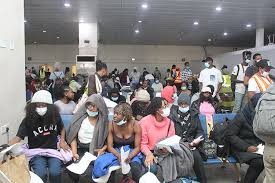Nigeria’s forex utilization for foreign education has experienced a significant decline of 83% in the first quarter of 2024, according to data from the Central Bank of Nigeria (CBN). Nigerians spent $38.17 million on foreign education expenses between January and March 2024, marking a sharp decrease from the $218.87 million recorded during the same period last year.

This staggering drop in spending on foreign education coincides with a crash in international student enrollment at universities in the United Kingdom. A survey conducted by Universities UK across 73 universities revealed a substantial decrease in the number of international students, particularly in postgraduate programs. In January, there was a 44% reduction in international student enrollment compared to the previous year, surpassing initial expectations.
The decline in international students, who typically pay higher fees for postgraduate courses, poses a significant financial challenge for UK universities. Data from Enroly, a platform used by approximately 60 universities, indicates a decline in interest among international students in studying in the UK, as evidenced by a significant drop in deposit payments compared to the previous year.
The decrease in foreign exchange (FX) spending for education services comes amidst Nigeria’s ongoing foreign exchange challenges. In February of this year, CBN Governor Yemi Cardoso presented to the House of Representatives that an alarming $40 billion had been expended on foreign education and healthcare. This substantial outflow of funds has contributed to the devaluation of the Naira and intensified pressure in the foreign exchange market due to forex scarcity.
While spending on foreign education experienced a drastic decline, there was a notable increase in FX spending for health-related and social services. The CBN data shows a 122% rise from $1.04 million in Q1 2023 to $2.31 million in the same period this year. Additionally, there was a remarkable 485% increase from $0.39 million recorded in the last quarter of 2023.
To address the challenges posed by excessive spending on foreign education and medical tourism, the CBN planned to implement stringent measures on foreign currency purchases through Bureau De Change (BDC) operators. These measures include a cap on foreign currency purchases for school fees at $10,000 per customer annually, with transactions conducted through the BDC’s domiciliary account to ensure direct payment to the educational institution. The guidelines also require specific documents, such as a duly filled e-Form A, proof of admission or course registration, the educational institution’s bill or invoice, and additional documents for postgraduate studies.
Furthermore, the CBN is imposing a limit of $5,000 per annum for foreign currency transactions related to medical bills abroad. Similar to educational fee transactions, funds for medical bills will be transferred directly from the BDC’s domiciliary account to the medical facility, supported by comprehensive documentation.
These proposed guidelines were eventually approved in May 2024 by the apex bank, further restricting the amount of forex spending on foreign education and medical tourism.
The decline in Nigerian spending on foreign education reflects the challenges faced by both the country’s foreign exchange market and UK universities’ financial sustainability. As the global landscape continues to evolve, it remains to be seen how these trends will impact the education sector in the long term.



